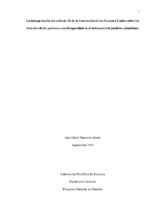| dc.contributor.advisor | Director. Osma Gómez, Pedro María | |
| dc.contributor.author | Pimiento Osorio, Juan David | |
| dc.coverage.temporal | 2018 | |
| dc.date.accessioned | 2020-06-10T19:06:36Z | |
| dc.date.available | 2020-06-10T19:06:36Z | |
| dc.date.issued | 2018 | |
| dc.identifier.uri | http://hdl.handle.net/20.500.11912/5562 | |
| dc.description | 85p.: (pdf); il. | spa |
| dc.description.abstract | La investigación aquí desarrollada, gira en torno a la aparente tensión existente, entre el artículo 12 de la Convención de las Naciones Unidas sobre los derechos de las personas con discapacidad y las normas de derecho privado vigentes en Colombia, que desarrollan dicha figura jurídica, en cuanto cada una de ellas, responde a finalidades distintas, claramente antagónicas. El problema presentado, se abordó desde el punto de vista normativo, en primera medida desde los antecedentes históricos de la capacidad jurídica, hasta una profunda valoración del instituto en el ordenamiento jurídico colombiano, incluyendo, las iniciativas legislativas al respecto, que podrían significar cambios profundos al sistema de las obligaciones civiles, como también, desde los presupuestos axiológicos del tratado internacional en mención, para con ello, presentar una propuesta de interpretación del artículo 12 del instrumento internacional mentado, que suponga un adecuado sincretismo entre los intereses de la Convención y la naturaleza jurídica propia en Colombia. | spa |
| dc.description.abstract | The research developed here revolves around the apparent tension between Article 12 of the United Nations Convention on the Rights of Persons with Disabilities and the rules of private law in force in Colombia, which develop this legal concept, in how much each of them, responds to different purposes, clearly antagonistic. The problem presented was approached from the normative point of view, firstly from the historical background of the legal capacity, to a deep appreciation of the institute in the Colombian legal system, including legislative initiatives in this regard, which could mean profound changes to the system of civil obligations, as well as, from the axiological assumptions of the international treaty in question, in order to present a proposal for the interpretation of article 12 of the international instrument mentioned, which implies an adequate syncretism between the interests of the Convention and the own legal nature in Colombia. | eng |
| dc.format.mimetype | application/pdf | |
| dc.language.iso | spa | |
| dc.publisher | Universidad Pontificia Bolivariana | spa |
| dc.rights | Attribution-NonCommercial-NoDerivatives 4.0 International | * |
| dc.rights.uri | http://creativecommons.org/licenses/by-nc-nd/4.0/ | * |
| dc.title | La interpretación del artículo 12 de la Convención de las Naciones Unidas sobre los derechos de las personas con discapacidad en el ordenamiento jurídico Colombiano | spa |
| dc.type | Tesis de Maestría | spa |
| dc.publisher.department | Escuela de Derecho y Ciencias Políticas | spa |
| dc.publisher.program | Maestría en derecho | spa |
| dc.type.hasVersion | publishedVersion | spa |
| dc.description.sectional | Bucaramanga | spa |
| dc.description.degreename | Magíster en Derecho | spa |


